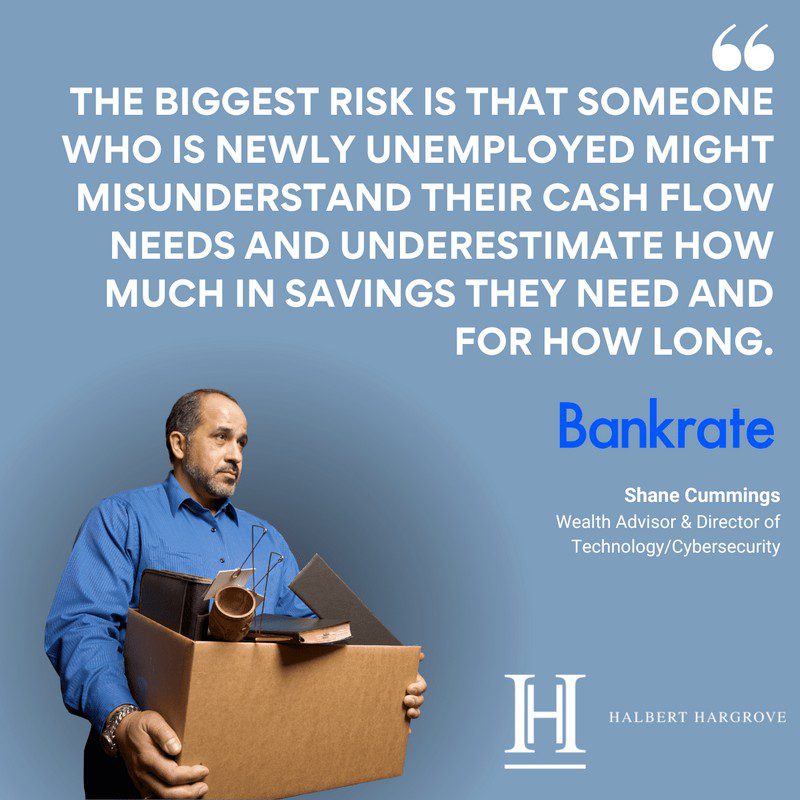By James Royal, Bankrate featuring Shane Cummings, CFP®, AIF®, Wealth Advisor & Director of Technology/Cybersecurity
At some point in their lives, the majority of Americans may feel the sting of unemployment, even if only for a few weeks. While having an emergency fund can be a great resource to keep the bills paid without you having to dip into investments, it can be hard to continue building your long-term wealth during this time.
Here’s how a few experts say you should invest when you’ve lost your job.
5 ways to invest when you’ve lost your job
It can be nerve-wracking to think about investing when you’ve just lost your job, but it can also present an opportunity for future success as you seek your next gig. But you’re not going to win the long-term investing race next year or the year after anyway, so it’s absolutely vital that you take care of today’s problems first.
Here’s how wealth advisors suggest that you invest when you’re facing unemployment.
1. Invest in yourself
One of the potentially best investments you can make is upgrading your own skills, making you more employable later. That might cost money, but it may simply involve putting in the work.
“It can be something directly or indirectly related to your profession,” says Ed de la Rosa, certified financial fiduciary with Solid Ground Financial, a financial planner in Tampa. “For example, you may know Office products well, but how well do you know Google Suite products? Google offers a free certification course.”
Some newly unemployed people may decide it’s time to go back to school for another degree while they wait out a recession. Or they may decide it’s time to switch careers entirely, perhaps to something that is more in tune with their interests or desires.
Whichever way you go, investing in yourself could help you earn more later.
2. Stand pat on your retirement account
“The biggest mistake would be to cash out of your 401(k), especially if you are under 59 ½,” says De la Rosa.
A 401(k) provides valuable tax advantages to retirement savers, including the ability to defer or avoid taxes on your investments altogether. So it’s a great way to save for retirement.
While cashing your 401(k) may help you get back on your feet, it could derail your financial future. You’ll likely end up paying taxes and penalties, too. So experts advise that it should truly be a last resort, not something you do when you simply don’t want to make hard choices.
If you don’t access those 401(k) assets, you’ll also give them time to rebound from what’s likely a relatively low price. You’ll avoid the “buy high, sell low” actions of many investors.
“More importantly you want to make tough financial decisions from a position of strength, both financially and psychologically,” says De la Rosa. “So don’t make big decisions while you’re unemployed. If you have zero income coming in, don’t feel pressure to invest new funds.”
And while having a 401(k) with a former employer may leave a sour taste in your mouth, don’t be so quick to roll that account into an IRA, either.
The newly unemployed “should not make any quick decisions on their 401(k) or 403(b) or other retirement plans from previous employers,” says Morgan Hill, CEO and owner of Hill and Hill Financial, an investment planning firm in the Atlanta area. “Their new job may have a great new plan that they can move those funds into.”
And if it doesn’t? You still have the option of rolling over your retirement plan into an IRA.
3. Make safe short-term investments for now
If you just lost your job, it can make a lot of sense to keep your investments focused on potential short-term needs. And yes, investors have some great short-term investments, especially now.
“The biggest risk is that someone who is newly unemployed might misunderstand their cash flow needs and underestimate how much in savings they need and for how long,” says Shane Cummings, CFP, wealth advisor at Halbert Hargrove. “They might take cash that should be invested conservatively or just kept in a high-yield savings account and instead put it into a very risky and concentrated stock position that falls dramatically.”
Cummings suggests that everyone should have at least three to six months in emergency reserves, and more if your job is specialized or hard to hire. This cash can be a great candidate for a high-yield savings account, or even a short-term CD, if you time your cash needs carefully.
The more cash you hold in an emergency account, the more you can ride out a downturn in the market, giving stock or stock funds – potentially your best long-term gainers – time to recover.
“If you’re unemployed and need to find cash to cover living expenses, you could end up in a position where you’re forced to sell a stock at a huge loss simply to make ends meet,” he says.
But if you have plenty of cash reserves, a downturn can actually be an opportune time to take advantage of lower-priced stocks and set yourself up for solid returns later.


